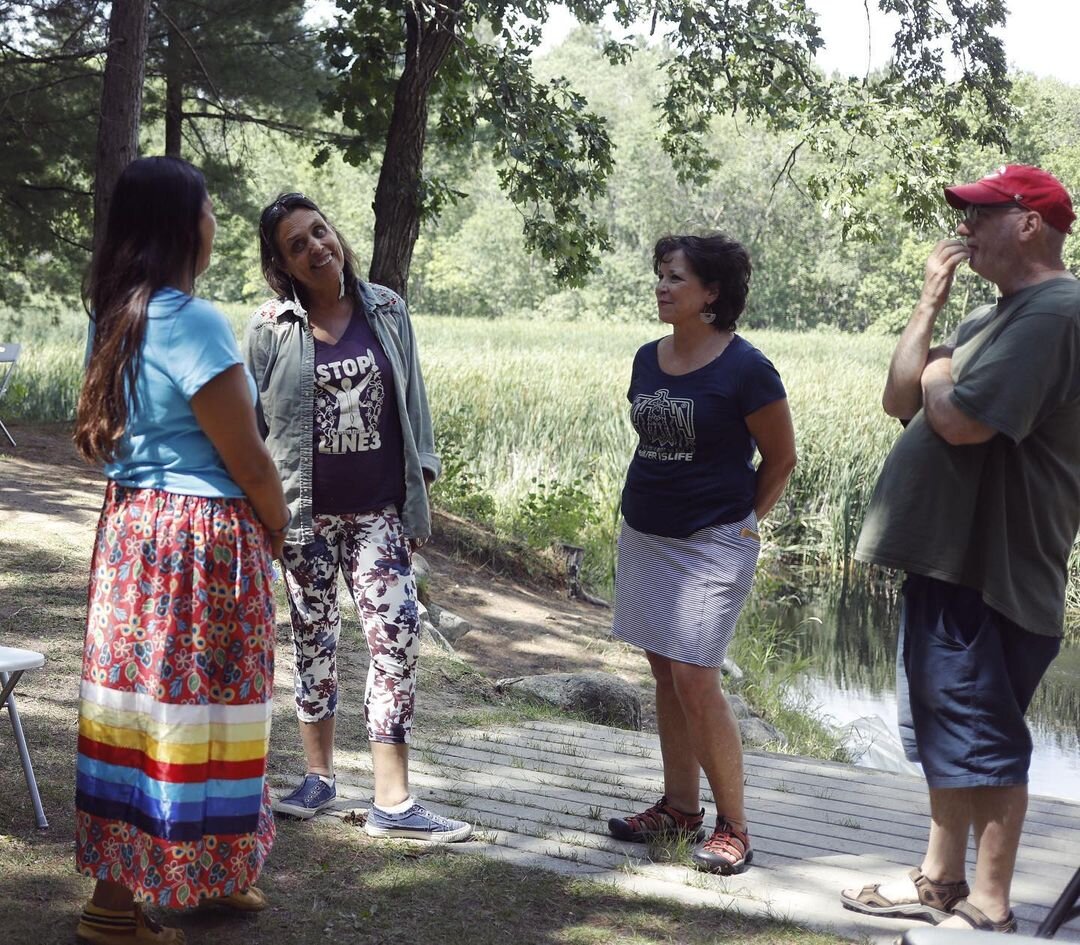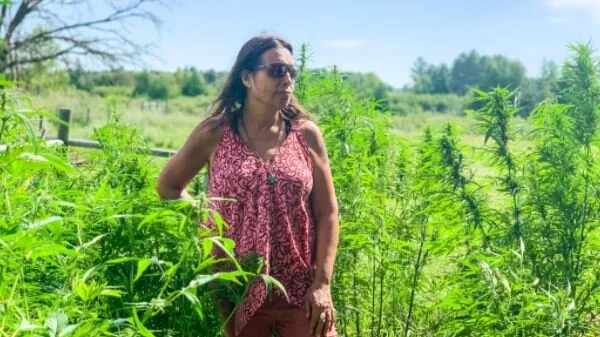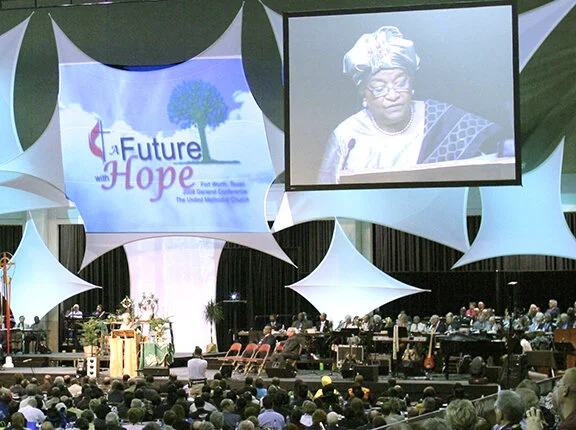Winona LaDuke has been a champion for Indigenous rights for years — and now she’s inspiring a new generation of activists to join the fight
LaDuke continues to be an inspiration to younger activists like Allie Redhorse Young. In 2020 Allie Redhorse Young created Ride to the Polls to encourage Dine people to vote.
Winona LaDuke, 'On Their Shoulders' by NOWThis, continues to be an inspiration to younger activists like Allie Redhorse Young. In 2020 Allie Redhorse Young created Ride to the Polls to encourage Dine people to vote.
Meet Winona LaDuke, the Indigenous Activist Inspiring the Next Generation
Winona LaDuke has been a champion for Indigenous rights for years — and now she’s inspiring a new generation of activists to join the fight
By NowThis
Published on 3/25/2022 at 12:45 PM
Winona LaDuke, Anishinaabe, is a world-renowned Indigenous activist known for fighting for Indigenous land rights, indigenous women’s rights, and natural resources.
At just 18 years old LaDuke testified before the United Nations about the exploitation of Native lands. After graduating from Harvard, LaDuke moved to the White Earth reservation and became involved in the Anishinaabeg fight to recover lands promised by an 1867 Federal treaty.
When the lawsuit was dismissed, young Winona became even more motivated to fight back, founding the White Earth Land Recovery Project, which aims to recover indigenous land. She also and founding the Indigenous Women’s Network in 1985.
Now in her 60’s, Winona has never stopped fighting. Most recently she was arrested while protesting the construction of a Pipeline 3in Northern Minnesota.
LaDuke continues to be an inspiration to younger activists like Allie Redhorse Young. In 2020 Allie Redhorse Young created Ride to the Polls to encourage Dine people to vote.
"BirdLife International and Audubon celebrate by women conservationists and activists across the world who are taking the future into their own capable hands."
Audubon Society, and BirdLife International inspired by women conservationists, Women In Flight, and activists across the world who are taking the future into their own capable hands. Winona LaDuke, is an economist, environmentalist, and writer known for her work on tribal land claims and preservation, as well as sustainable development.
Women In Flight
Women conservationists have long been at the forefront of the movement to protect birds, but there is so much more we can and must do for the future of the movement.
This piece was co-authored by Patricia Zurita, CEO BirdLife International.
Women scientists, activists, and conservationists have long been at the forefront of the movement to protect birds and nature. Eliza Philips and Emily Williamson co-founded the Royal Society for the Protection of Birds in the UK, while Minna B. Hall and Harriet Hemenway co-founded Massachusetts Audubon Society. And the list goes on: Rosalie Edge created Hawk Mountain Sanctuary, Rachel Carson sounded the alarm around DDT and birds in Silent Spring, and Mamie Parker helped uphold the integrity of the Migratory Bird Treaty Act during a trailblazing career in public service.
Women’s History Month is an opportunity to reflect on our past, our present and the hope we have for the future. Today, we are honored to continue the tradition of protecting birds and the world we all share. Though women have long been at the center of this work around the world—often in the face of immense challenges—it is rare for them to lead organizations with a mission to protect birds and the planet. In fact, only 21% of large nonprofit Chief Executive Officers are women. In our case, Ms. Zurita, an Ecuadorian conservation economist, holds the distinction of being the first woman from a developing nation to lead a legacy international conservation organization (BirdLife International turns 100 this year). Dr. Gray, an ornithologist and life-long conservationist, is the first woman to hold the CEO title in National Audubon Society’s 117-year history. Considering the fact that few nonprofit CEOs are women and that three-quarters of nonprofit CEOs are white, we understand that our leadership also carries with it a responsibility to role model a new style of leadership while creating a more equitable future.
“We are also inspired by women conservationists and activists across the world who are taking the future into their own capable hands. Winona LaDuke, is an economist, environmentalist, and writer known for her work on tribal land claims and preservation, as well as sustainable development. ”
Dr. Hahrie Han is a leading political scientist whose research in civic and political participation and effective social movements points the way for nonprofits like ours to effectively engage our members and create durable change. (And Ms. LaDuke and Dr. Han were keynote speakers at the 2019 Audubon Convention.) From Elizabeth Wanjiru Wathuti, a Kenyan environment and climate activist and founder of Green Generation Initiative, to Nazareth Cabrera, leader of the Uitoto Indigenous people who inhabit the Colombian Amazon, to Nemonte Nenquimo, a Waorani leader in Ecuador who's been leading the legal case against TEXACO, visionary women are leading the way.
As leaders at all levels of the conservation movement think about the next 10 years and beyond in the path to address the climate and biodiversity crises, women will continue to play a critical role in how those actions play out. Women can and must lead as scientists, program heads, CEOs, executive directors, board chairs, and community leaders. We must be compensated and respected in equal ways to our male colleagues and peers. And women with privilege owe it to the most marginalized in our own community to effectively advocate for a more equitable future for all women, including transgender women and Black, Indigenous, and other women of color.
This is why we are asking you to join us. Support the women-led conservation efforts making a difference across the globe today and elevate the next generation of women leaders in conservation.
Podcast: 'Don't Pick A Fight With Mother Earth, You're Not Going To Win.' Winona LaDuke on Indigenous Sovereignty, Land Back, and Fighting Pipelines.
'Don't Pick A Fight With Mother Earth, You're Not Going To Win.' Winona LaDuke on Indigenous Sovereignty, Land Back, and Fighting Pipelines
'Don't Pick A Fight With Mother Earth, You're Not Going To Win.' Winona LaDuke on Indigenous Sovereignty, Land Back, and Fighting Pipelines.
Winona LaDuke is probably the most dedicated, smart and hilarious activist you will ever come across. She lives on the White Earth Indian Reservation in Northwestern Minnesota, with about 130,000 other Anishinaabe and Ojibwe people. Since founding the White Earth Land Recovery Project in 1989, and Honor the Earth in 1983, she’s been fighting to preserve the indigenous sovereignty and environmental integrity of her land and people there.
She also notably ran for Vice President with Ralph Nader for the Green Party in 1996 and 2000. LaDuke and her collaborators in Minnesota just waged a years-long battle against the Line 3 pipeline, which Canadian energy company Enbridge ultimately pushed through in 2021.
That fight was building on her work against the Dakota Access Pipeline at Standing Rock, a watershed moment in anti-pipeline protest, and in building a new type of movement linking environmental, indigenous, and racial justice activists. In this wide-ranging interview for Protest & Survive, LaDuke discusses being present in her community, anti-colonialism land back, building local sustainable economies, and trying every tactic to win.
Produced and hosted by Reed Dunlea, edited by Jason Halal, music by Jesse Crawford, and photography by Keri Picket.
Video 2022 MLK Keynote Villanova: Winona LaDuke Sacred Relationships: The Land, Justice and Redemption
2022 Keynote Speaker: Winona LaDuke Sacred Relationships: The Land, Justice and Redemption Tuesday, January 18, 2022, 7–8:30 PM (VIRTUAL) with the Villanova University’s Augustinian Catholic.
2022 Keynote Speaker: Winona LaDuke Sacred Relationships: The Land, Justice and Redemption Tuesday, January 18, 2022, 7–8:30 PM (VIRTUAL) with the Villanova University’s Augustinian Catholic.
Winona LaDuke welcomed as new leader of SOLIDARITY COUNCIL ON RACIAL EQUITY
Winona LaDuke welcomed as new leader of SOLIDARITY COUNCIL ON RACIAL EQUITY, W.K. Kellogg Foundation.
SOLIDARITY TO ADVANCE RACIAL EQUITY AND INSPIRE COLLECTIVE ACTION
Solidarity Council on Racial Equity members are recognized global change leaders in advocacy, the arts, business, education and media. Each stands at the forefront of equity in the public arena. Each is celebrated in his or her professional sphere. Each brings a stirring voice to conversations in the public arena, one that resonates with W.K. Kellogg Foundation values and commitment to racial equity.
As part of the Solidarity Council on Racial Equity, these powerful voices are joining together to reach beyond familiar circles. In partnership with the Kellogg Foundation, they are contributing insight and creative energy to advance racial equity and create a platform for collective action.
ABOUT
SOLIDARITY COUNCIL on RACIAL EQUITY
SOLIDARITY TO OPEN HEARTS AND MINDS
The W.K. Kellogg Foundation has an enduring commitment to racial equity. We know that for children to thrive, their communities need to be equitable places of opportunity.
Yet, we live in a world that continues to favor some human beings over others; one that advances opportunities for a few at the expense of too many.
At this moment, although many hunger for unity, no one voice has the power or reach to draw people together around equity. The Solidarity Council on Racial Equity (SCoRE) was formed in response – to inspire more people to actively pursue equity.
“To keep moving towards equality, our ranks must swell with those committed to racial progress. When we stand together, we are closer to creating the society that all of our children deserve.”
La June Montgomery Tabron
President and CEO
W.K. Kellogg Foundation
Aljazeera Studio B: Unscripted: Indigenous and anti-apartheid lessons for climate justice with Kumi Naidoo and Winona LaDuke
Activists Kumi Naidoo and Winona LaDuke on how to sustain resistance movements and secure a just economic transition.
From the front lines of the anti-apartheid and environmental justice movements, this episode of Studio B: Unscripted features two lifelong activists.
Indigenous and anti-apartheid lessons for climate justice
Activists Kumi Naidoo and Winona LaDuke on how to sustain resistance movements and secure a just economic transition.
From the front lines of the anti-apartheid and environmental justice movements, this episode of Studio B: Unscripted features two lifelong activists.
Author, economist and two-time vice presidential candidate of the US Green Party, Winona LaDuke, is co-founder of Honor the Earth, a non-profit organization dedicated to environmental and Indigenous rights.
In Part 1, they discuss how the COVID-19 pandemic is a wake-up call for major system redesign.
From the front lines of the anti-apartheid and environmental justice movements, this episode of Studio B: Unscripted features two lifelong activists. Author, economist and two-time vice presidential candidate of the US Green Party, Winona LaDuke, is co-founder of Honor the Earth, a non-profit organisation dedicated to environmental and Indigenous rights. An anti-apartheid activist from age 15, Kumi Naidoo later helped with South Africa’s inaugural democratic election. He went on to head Greenpeace and Amnesty International, and is currently Global Ambassador for Africans Rising.
In Part 2, they discuss lessons from Indigenous knowledge and the anti-apartheid struggle for the climate movement.
WINONA LaDUKE NAMED TO FORBES “50 OVER 50 – WOMEN OF IMPACT” LIST; MORE THAN 10,000 NOMINATIONS WERE SUBMITTED
Forbes 50 over 50 Awards: 62 | Founder, White Earth Land Recovery Project
Forbes Launches Inaugural 30 50 Summit, Cross-Generational Women’s Event In Abu Dhabi, For International Women’s Day 2022
Forbes “50 Over 50” platform, in partnership with Mika Brzezinski’s “Know Your Value,” is dedicated to shining a light on women over the age of 50 who have achieved significant success later in life, often overcoming formidable odds or barriers. The first 50 Over 50 list launched in June 2021, initially honoring 50 women, and was expanded to a total of 200 women recognized for their impactful careers in the categories of Investment, Impact and Vision.
Forbes gathered the list honorees today at an event featuring First Lady Dr. Jill Biden in New York City on Wednesday afternoon, December 15, 2021.
The Executive Director and co-founder of the Indigenous-led environmental justice non-profit, Honor the Earth, La Duke and her fellow honorees were recognized for “changing their communities and the world in ways big and small through social entrepreneurship, law, advocacy and education.” The 50 were selected from more than 10,000 nominations.
Other women recognized include Linda Thomas-Greenfield, U.S. Ambassador to the U.N;, Judith Spitz, Founder and Executive Director, Break Through Tech; Ala Stanford, Founder, Black Doctors Covid Consortium, Margaret Moss, Associate Professor and Director, First Nations House of Learning, University of British Columbia; Val Demmings, Congresswoman, Florida's 10th district; Debi Brooks, Cofounder and CEO, The Michael J. Fox Foundation for Parkinson's Research; Hali Lee, Founder, Asian Woman Giving Circle; and many more.
Forbes singled out LaDuke’s work for The White Earth Land Recovery Project for its ongoing revival of Indigenous life-ways and to protect native seeds, traditional foods, and knowledge of Indigenous land-based communities, including the maintenance of cultural practices – including ways to address intergenerational trauma through mind-body-spirit medicine practices -- and the resistance to the global, industrialized food system and genetic engineering.
Her work also includes Winona's Hemp & Heritage Farm, and 8th Fire Solar, creating high-quality, efficient and renewable solar thermal panels for heating homes and small businesses throughout the continent. 8th Fire Solar is part of a new initiative of Honor the Earth called Akiing, which is the Ojibwe word for “the land to which we belong.” This non-profit Community Development Corporation was launched in 2017 with the goal to transition to a truly sustainable local economy, one that better aligns with Native American values and culture.
“I am honored to be among a group of powerful women from all walks of life who defy what a woman over 50 can or can’t do,” LaDuke says. “And I’m grateful for the recognition of our essential work among Indigenous people in northern Minnesota that preserves our culture and protects our land and waters.”
More About Winona La Duke and Her Previous Awards
Winona LaDuke is an Anishinaabekwe (Ojibwe) enrolled member of the Mississippi band of Ashinaabeg who lives and works on the White Earth Indian Reservation. She is a mother, grandmother and hemp farmer, and the former two-time Vice Presidential candidate with Ralph Nader on the Green Party ticket. Winona founded the White Earth Land Recovery Project in 1989 and served as its executive director for 25 years. She is currently the Executive Director of Honor the Earth, where she works on a national level to advocate, raise public support, and create funding for frontline Native environmental groups.
In 1994, Winona was nominated by Time Magazine as one of America’s fifty most promising leaders under forty years of age. She was awarded The Thomas Merton Award in 1996, The Biha Community Service Award in 1997, The Ann Bancroft Award for Women’s Leadership Fellowship, and The Reebok Human Rights Award (which she used to begin the White Earth Land Recovery Project). In 1998, Ms. Magazine named her woman of the year for her work with Honor the Earth.
She is also the author of seven books including: The Militarization of Indian Country (2011); Recovering the Sacred: The Power of Naming and Claiming (2005); The non-fiction book All Our Relations: Native Struggles for Land and Life (1999, South End Press); and a novel, Last Standing Woman (1997, Voyager Press). Her new book, To Be a Water Protector: Rise of the Wiindigoo Slayers (Fernwood Press/Columbia University), is an expansive, provocative engagement with issues that have been central to her many years of activism, including seven years of battling Line 3 -- an Enbridge tar sands oil pipeline in northern Minnesota.
A graduate of Harvard and Antioch Universities, Winona has written extensively on Native American and Environmental issues. She is a former board member of Greenpeace USA and serves as co-chair of the Indigenous Women’s Network, a North American and Pacific Indigenous women’s organization.
Democracy Now! celebrated 25 years on the air with a virtual event on December 7th. Special guests included, Winona LaDuke
Winona LaDuke joins Democracy Now! Celebrating 25 years on the air virtual event on December 7th, 2021.
Winona LaDuke joins Democracy Now! Celebrating 25 years on the air virtual event on December 7th, 2021.
Special guests included:
Noam Chomsky, world-renowned political dissident and author
Angela Davis, legendary activist and scholar
Danny Devito, Emmy Award-winning actor
Martín Espada, National Book Award-winning poet
Danny Glover, actor and activist
Winona LaDuke, Indigenous leader
Arundhati Roy, the acclaimed Indian writer and activist.
The event also featured musical performances by the Grammy Award-winning Mexican singer & songwriter Lila Downs and Tom Morello of Rage Against the Machine.
Amy Goodman, Juan González & Nermeen Shaikh hosted the virtual event.
Watch the ‘Shell River Seven #StopLine3’ with I am a Patriot by Jackson Brown film directed by Keri Pickett below.
Filmed by Honor the Earth’s River Akemann and Sarah LittleRedfeather and others.
Learn more about Drop The Charges
Donate in honor of Democracy Now! 25th anniversary celebration!
Your donation will keep this 25th anniversary virtual event free for our worldwide audience. If you give $50 or more, you can choose from a great selection of limited edition 25th anniversary thank you gifts!
Women In History - Winona LaDuke
November is Native American Heritage Month and we are happy to feature this incredible Native American icon, Winona LaDuke.
November is Native American Heritage Month and we are happy to feature this incredible Native American icon, @winonaladuke. She is a feminist, an economist, and an environmentalist, in short, she is our kind of woman. Sit tight and read up on her achievements:
Winona LaDuke is an internationally renowned economist, environmentalist and an activist working on issues of sustainable development, renewable energy and food systems. She devoted her life to advocating for Indigenous control of their homelands, natural resources, and cultural practices. She works on the intersection of economics and environment to create a thriving and sustainable community for the Indigenous populations across America. The Time Magazine included her among the 50 leaders for the future. She continues to fight for Native Americans’ environmental interests. She is an advocate for hemp and sees it as a perfect substitute for cotton because it requires less water. Winona is a feminist-economist-environmentalist and its her dream to create an indigenous women led economy based on local food, energy, and fiber, that is kind to the Earth.
Mariana Brandman, NWHM Predoctoral Fellow in Women’s History | 2020-2022
Winona LaDuke, a Native American activist, economist, and author, has devoted her life to advocating for Indigenous control of their homelands, natural resources, and cultural practices. She combines economic and environmental approaches in her efforts to create a thriving and sustainable community for her own White Earth reservation and Indigenous populations across the country.
Winona LaDuke was born in Los Angeles, California on August 18, 1959 to parents Vincent and Betty (Bernstein) LaDuke. Her father, also known as Sun Bear, was Anishinaabe (or Ojibwe) from the White Earth Reservation in Minnesota. He was an actor, writer, and activist. Her mother was an artist and activist. LaDuke is an Anishinaabekwe (Ojibwe) enrolled member of the Mississippi Band Anishinaabeg. Her father brought her to powwows and other tribal functions, events that made a deep impression on the young LaDuke. LaDuke’s parents divorced when she was five and she moved with her mother, who was of Russian Jewish descent, to Ashland, Oregon. LaDuke visited White Earth frequently and, at her mother’s encouragement, spent summers living in Native communities in order to strengthen her connection with her heritage.
LaDuke attended Harvard University and graduated in 1982 with a degree in rural economic development. While at Harvard, LaDuke’s interest in Native issues grew. She spent a summer working on a campaign to stop uranium mining on Navajo land in Nevada, and testified before the United Nations in Geneva, Switzerland about the exploitation of Indian lands.
After Harvard, LaDuke took a position as principal of the reservation high school at the White Earth Ojibwe reservation in Minnesota. She soon became involved in a lawsuit filed by the Anishinaabeg people to recover lands promised to them by an 1867 federal treaty. At the time of the treaty, the White Earth Reservation included 837,000 acres, but government policies allowed lumber companies and other non-Native groups to take over more than 90 percent of the land by 1934. After four years of litigation, however, the lawsuit was dismissed.
The lawsuit’s failure motivated LaDuke’s ensuing efforts to protect Native lands. In 1985, she helped establish and co-chaired the Indigenous Women’s Network (IWN), a coalition of 400 Native women activists and groups dedicated to bolstering the visibility of Native women and empowering them to take active roles in tribal politics and culture. The coalition strives both to preserve Indigenous religious and cultural practices and to recover Indigenous lands and conserve their natural resources.
In 1989, LaDuke completed a master’s degree in community economic development at Antioch University. That same year, she founded the White Earth Land Recovery Project (WELRP), using funds the Reebok Foundation awarded her for her human rights work. WELRP is an organization that seeks to buy back reservation land previously purchased by non-Native people to foster sustainable development and provide economic opportunity for the Native population. It is now one of the largest reservation-based nonprofits in the country.
WELRP’s sustainable development initiatives include renewable energy efforts, indigenous farming and local food systems, and improved sanitation measures. They use the land they buy to generate wind energy; they have helped protect the local wild rice crop from patenting and genetic engineering; they encourage the consumption of traditional foods to combat rising rates of Type 2 diabetes in the community; and they run a diaper service that saves money and alleviates waste from disposable diapers. The organization raises money through the sale of traditional crafts, jewelry, and food to fund these programs.
Though busy with the WELRP, LaDuke continued her advocacy work with the Indigenous Women’s Network. In the early 1990s, LaDuke arranged a national concert series with the musical group Indigo Girls to raise awareness among young people about Native issues. In 1993, LaDuke and the Indigo Girls co-founded Honor the Earth, an advocacy and fundraising group that works on behalf of Native environmental organizations. Honor the Earth has granted over two million dollars to more than 200 Native American communities since its founding.
In 1996 and 2000, LaDuke served as Ralph Nader’s running mate on the Green Party presidential ticket. The Green Party describes itself as an independent party that emphasizes grassroots democracy and the ecological health of the planet. LaDuke’s ticket won 0.7 percent of the vote in 1996 and 2.7 percent in 2000. LaDuke returned to electoral politics in 2016 when she ran for chair of the White Earth tribal council, though her bid was unsuccessful.
LaDuke has received many honors for advocacy work. In 1994, Time magazine named her one of the Fifty Leaders for the Future. In 1998, Ms. Magazine named her one of their Women of the Year. In 2015, she received an honorary doctorate from Minnesota’s Augsburg College and in 2017, LaDuke won the University of California’s Alice and Clifford Spendlove Prize in Social Justice, Diplomacy and Tolerance.
LaDuke has authored and co-authored numerous books concerning issues facing the Native American community. Her work Native Struggles for Land and Life (1999, reprinted 2016), for instance, tells of Native resistance to cultural and environmental threats.
LaDuke stepped down as the executive director of the White Earth Land Recovery Project in 2014, but continues to fight for Native Americans’ environmental interests. She was a leader at the 2016 Dakota Access Pipeline protests that sought to protect water access and sacred Indigenous lands in North Dakota. Today, the mother of six grown children (three biological and three adopted) devotes much of her time to farming. Located on the White Earth reservation, her farm grows heritage vegetables and hemp. LaDuke tries to publicize hemp’s environmental advantages: it requires less water to grow than cotton; can replace petroleum-based synthetics in clothing and other products; and absorbs carbon from the atmosphere, rather than releasing it. Winona’s Hemp & Heritage Farm is her latest endeavor; a farm and nonprofit agency, its mission is to create an Indigenous women-led economy based on local food, energy, and fiber, that is kind to the Earth.
Published April 2021.
Extracted from www.womenhistory.org
From jail to Aspen: Winona LaDuke headlines Wilderness Workshop benefit
“Protect the water. Don’t commodify it, protect it,” LaDuke said. “However that happens, work with indigenous people to grow local food and resource economies, because global economies are precarious.”






From jail to Aspen: Winona LaDuke headlines Wilderness Workshop benefit
By Christine Benedetti/Special to the Aspen Daily News | Aug 12, 2021
Photos by Keri Pickett and Flow
Less than a month ago, Winona LaDuke spent three nights in Minnesota’s Wadena County Jail on charges of trespassing. She and six other women had chained themselves together on the Shell River to protest the construction of Line 3, a pipeline connecting Alberta’s tar sands to a Lake Superior refinery.
“They didn’t really give us a lot of choices — they were censoring the news up here,” she said. “Seven hundred people have been arrested. I’m just one of many.”
LaDuke may be just one of those hundreds, but she is among the most well known: the Ojibwe tribe member is a Native rights activist who rose to national prominence as the Green Party’s vice presidential nominee, with Ralph Nader, in the 1996 and 2000 elections. She is in Aspen to speak at Wilderness Workshop’s annual benefit, Wild Feast, tonight at the Hotel Jerome.
For the majority of this decade, LaDuke, who is also executive director of Honor the Earth, has been fighting Enbridge’s Line 3 pipeline, but it’s just recently that the issue is getting more attention, as protests and construction ramp up. The 1,097-mile crude oil pipeline primarily runs through Minnesota, where its construction — 80% of which is complete — is replacing an existing 282-mile pipeline with a new 330-mile route. The route crosses more than 200 water bodies and 75 miles of wetlands, and opponents cite environmental impact, violation of U.S. treaties with Native Americans and climate change as reasons to stop its construction.
“I’ve been fighting the Enbridge pipeline for seven years of my life, ya know?” she said. “Because it’s a bad idea. It was a bad idea seven years ago. It’s a worse idea now. Through the smoke of the Canadian wildfires, I can’t even see the Enbridge trucks barreling down the road toward me.”
The pipeline was approved under the Trump administration, but LaDuke is critical of the Biden administration’s continued handling of it.
“No pipeline, no problem. I want the Biden administration to pull the permits,” she said. “They just gave away 5 billion gallons of water, the largest allocation of water in the history of the state.”
She was involved in protesting the Dakota Access Pipeline in 2016, which became an international issue. LaDuke’s grassroots activism has often led to larger movements. She says her influence is thanks to the everyday people who also engage. That community-led style directly ties to Wilderness Workshop’s mission.
“There’s a connection in terms of how some of that work happens: local communities standing up to protect the lands and water they care about and value as well,” says Will Roush, Wilderness Workshop executive director. “It’s people who know the places they live in, working to protect them. She and her colleagues put their bodies on the line, which is deeply moving. Our community has shown up in other ways to protect their places.”
Wilderness Workshop fights to protect the 2.3-million-acre White River National Forest and public lands surrounding it. Current priority issues that the nonprofit is working on include ongoing battles to stop new oil and gas leasing in the North Fork Valley; protecting the Thompson Divide from oil and gas development; working to stop the construction of a new dam in the Homestake Valley; and obtaining Wild & Scenic designation for the Crystal River to, among other threats, prevent future dam development on it.
There is a lot of “clean up” from the Trump Administration, Roush said. And, as LaDuke pointed out, environmentalists are trying to hold Biden accountable for promises he made when on the campaign trail.
There are a limited number of tickets still available for tonight’s event, but people looking to get involved can take action other ways, suggest LaDuke and Roush.
“Protect the water. Don’t commodify it, protect it,” LaDuke said. “However that happens, work with indigenous people to grow local food and resource economies, because global economies are precarious.”
To enact this, LaDuke runs a 40-acre hemp farm on the White Earth Indian Reservation, and she is adamant that the future lies in renewable resources.
Roush says people can engage with Wilderness Workshop by participating in any of its summer events, including restoration projects and educational hikes, or by signing up for its email list where the organization frequently sends out calls to action.
“She’s an inspiration to me and to a lot of folks — just to think about someone who’s dedicated their whole life to protecting lands and waters in a holistic manner, from fighting big battles to protecting ancestral lands and water, to agriculture and building community within her tribe,” he said. “It’s amazing to see someone so dedicated in such a comprehensive way.”
Winona LaDuke Feels That President Biden Has Betrayed Native Americans
Winona LaDuke Feels That President Biden Has Betrayed Native Americans
By David MarchesePhoto illustration by Bráulio Amado
Talk Aug. 6, 2021
Winona LaDuke Feels That President Biden Has Betrayed Native Americans
By David Marchese
Photo illustration by Bráulio Amado
Quoted (some) below is David Marchese’s interview of Winona LaDuke for the New York Times Magazine.
“Right now in northern Minnesota, the Canadian oil-and-gas-transport company Enbridge is building an expansion of a pipeline, Line 3, to carry oil through fragile parts of the state’s watersheds as well as treaty-protected tribal lands. Winona LaDuke, a member of the local Ojibwe tribe and a longtime Native rights activist, has been helping to lead protests and acts of civil disobedience against the controversial $9.3 billion project.”
“I spend a lot of time,” she says, “fighting stupid ideas that are messing with our land and our people.” So far the efforts of LaDuke, who is 61 and who ran alongside Ralph Nader as the Green Party’s vice-presidential nominee in 1996 and 2000, have been in vain. The Biden administration declined to withdraw federal permits for the project, a stance that Line 3 opponents see as hypocritical given the president’s cancellation of the Keystone XL pipeline as well as his vocal support for climate action.
“I have had the highest hopes for the Biden administration,” LaDuke says, “only to have them crushed.”
“Not long after we spoke, LaDuke was arrested and jailed for violating the conditions of her release on earlier protest-related charges, which required her to avoid Enbridge’s worksites. She has since been released.”
How do you understand Biden’s decision to allow the construction of Line 3?
“He’s hellbent on destroying Ojibwe people with this pipeline. Why do we get the last tar-sands pipeline, Joe? It’s kind of like when John Kerry went and testified to Congress against the Vietnam War and said, Who’s going to tell that soldier that he’s the last one to die for a bad war? Who’s going to tell those Ojibwes that they’re the last ones to be destroyed for a bad tar-sands pipeline? What’s right about this? I organized people to vote for Biden. I drove people to the polls through seas of Trump signs. I drove Indian people to vote who hadn’t voted in 20 years. And what did we get from Joe? A pipeline shoved down our throats.”
Are you saying that you think Biden has some specific animosity toward the Ojibwe?
“No. He doesn’t have animosity, but he’s privileging a Canadian multinational. He knows that this pipeline runs right through our reservations. They know, and have a choice of what they’re going to support. I think it’s a trade-off for him: I canceled Keystone, and so we’ll just let this one go through, because it’s a replacement pipe. It’s not. It’s a new pipe.”
Line 3 is an expansion and rerouting of an outdated Enbridge pipeline.
“It’s horrendous. It’s a violation of not only the treaties but also every ounce of common sense. It’s a drought right now. But Enbridge put in an amendment: They get five billion gallons of water”
The Minnesota state government allowed Enbridge to move five billion gallons of water — up from an initial permit request of 510 million gallons — in order to aid in the construction of the pipeline’s trench. Critics argue that moving this much water, especially during a drought, endangers the local ecosystem.
“ … out of a region where rivers are 75 percent below normal. What’s with that? There was not a federal environmental impact statement on this pipeline, and the Biden administration just said we don’t need to do one. I mean, why?
When I’ve heard from people who work in the oil industry, people who are understandably anxious about keeping their jobs, they’ve said that the protesters are the hypocrites:
“They want us to stop drilling for oil, but what do they think is keeping their lights on?” Does that argument make sense to you?
That’s a stupid thing to say. Who wants to hang around in the fossil-fuels economy when you could go electric? I’m waiting for my electric F-150.
Ford announced earlier this year that it would begin selling an electric version of its signature pickup-truck model in spring 2022.
The next economy needs innovation. I like what Arundhati Roy, the novelist and activist, said.
“She talks about the pandemic as a portal between one world and the next. What do you want to bring through the portal? Your avarice? Your dirty rivers? Your dirty skies? Or do you want to walk through clean? Look, the world is changing. Those guys you mentioned got a playbook from the last economy, and it doesn’t work anymore. It didn’t work before. We told y’all that, but it’s time to move on.”
I think if you were to ask people to picture where the country’s big social and political arguments — about things like cultural identity and systemic racism — are taking place, they would picture cities. But what’s the view of those arguments from where you live?
“Well, we call this the Deep North, and there are seven Ojibwe reservations here. A lot of our land has been taken by non-Indians and the state. We should be the wealthiest people, and we’re the poorest. These guys built these towns off of us. I think about the myth of Paul Bunyan. You don’t actually believe Paul Bunyan was a real guy, do you?”
You’ve criticized Enbridge for “paying” the local police. But isn’t what’s happening that the company is reimbursing law enforcement for expenses that they wouldn’t have otherwise incurred? Maybe it’s just doublespeak, but that is a slightly different thing than funding them, right?
“They’ve incentivized oppression where cops can get extra money if they take more patrols. So a lot of people are stopped — no reason to stop them but to rack it up. And you know, a couple days ago I was on the river facing a bunch of cops, and I said the corporation violated the law. They had a spill. It’s called a frac-out.”
Often caused by a poor choice of drilling fluids or poor drilling practices, a frac-out occurs when drilling fluids either penetrate the bedrock or flow up through the rock and sand surrounding it. The fluids can then damage the adjacent areas.
“You’re here to arrest us, but they’re the ones who committed the crime”
What’s the outlook for the rest of the summer?
“Hell. They’re cutting, they’re grinding, they’re welding, they’re smashing, they’re laying pipe. They’re all around you, and they’re coming toward you. That’s pretty traumatic. A lot of cops, a lot of destructive equipment, a lot of people scared. They’re going to try to put this pipe in. They’re rolling over us. We’re going to do our best to stand in these places, but that’s the outlook. Hopefully a lawsuit stops them in their tracks after they brutalize us for another month. I’m not saying that Enbridge is beating me up, but they are.
They’re kicking my ass right now
Women led by Indigenous rights activist Winona LaDuke sat in lawn chairs blocking Enbridge’s Line 3 construction at Shell River in Minnesota on July 19th. Photo by Sarah LittleRedfeather
MORE NEWS
The Progressive Magazine: Indigenous People, Line 3 is a Battle Over the Future: Opposition is mounting to a project that threatens Native lands, and the planet.
The Pine Journal LaDuke: Letter from the Wadena County Jail Winona LaDuke and six other women were arrested July 19 during a protest at the Shell River in front of the pending Enbridge Line 3.
The Circle News Political Matters – August 2021 On July 19, seven Native women, including Winona LaDuke, founder and leader of the environmental group Honor the Earth, were arrested for trespassing by Wadena County sheriff’s deputies, while they were sitting together and praying on an easement near Park Rapids at the Shell River, which the pipeline will cross in five places, according to a report in Indian Country Today. LaDuke, who’s also a correspondent for The Circle, was released from the Aitkin County jail after being locked up for three days.
The Colorlines Indigenous Leader Says Biden Administration is Doing 'Nothing' to Stop Minnesota Pipeline Indigenous Leader Says Biden Administration is Doing ‘Nothing’ to Stop Minnesota Pipeline “Biden’s acting like he canceled one pipeline so he gets a gold star. But you don’t get a gold star from Mother Earth to let Line 3 go ahead,” Indigenous rights organizer Winona LaDuke told Slate.
The Waging Non-Violence: Everyone has a role to play in stopping the Line 3 pipeline. Indigenous water protectors and allies are effectively engaging all four roles of social change — just what's needed to beat a company as powerful as Enbridge.
The Turtle Island News: Minnesota hit with novel 'natural right' tribal lawsuit over Line 3. Manoomin v DNR
The White Earth Band of Ojibwe tribe in northwestern Minnesota has sued the state of Minnesota in tribal court over its issuance to Enbridge of a permit to divert water as part of its Line 3 oil pipeline project in the state's north. The suit on behalf of wild rice Winona LaDuke: White Earth Nation recognizes rights of wild rice here's why: Manoomin (“wild rice”) now has legal rights.
Line 3: White Earth argues DNR water permit violates wild rice rights: "The legal argument is that manoomin, in our culture and world, is a living entity, like everything else,” said Frank Bibeau, a tribal attorney representing the White Earth band. “It has rights just like us to exist and flourish and multiply. And it's not being watched out for.”
It has been a busy summer.
Please subscribe and see more news updates posted onto our website.
Winona LaDuke: Return to Rice Lake
Wild rice, or manoomin in Ojibway, is the way of life for this village, and for most of the White Earth Reservation. It feeds the body and it feeds the soul, with hundreds of thousands of pounds produced for not only our community but for sale. Today the manoomin is feeding the souls, as tribal members and friends come and gather to honor the rice, and to challenge not only Enbridge, but the Minnesota Department of Natural Resources, which has just allocated 5 billion gallons of water to Enbridge for Line 3, in the middle of the deepest drought we can remember.
“You can feel the wind talk to the rice.”
Lew Murray, Rice Lake Village
It’s Rice Lake Village on the White Earth Reservation – at the site of the mother lode of wild rice, Lower Rice Lake. Lew Murray stands in front of the gathering — about 200 or so people. They have come together to greet the runners who’ve just covered 26 miles to honor the wild rice — and protect it. This is a joyful crowd. Local residents are just starting to get together out-of-doors after pandemic restrictions ease, and we are all happy to see each other.
The Women Over 50 Making A Difference On The Environment
The Women Over 50 Making A Difference On The Environment | Morning Joe | MSNBC
Forbes' Randall Lane and Morning Joe's Daniela Pierre-Bravo discusses Winona La Duke and more women over 50 making a difference in the cause for a sustainable environment.
Mother Earth Day Special Event from Honor the Earth & Native Roots Radio!
This event is celebrating the Radio Premier of "No More Pipeline Blues, ft. Indigo Girls, Bonnie Raitt, Winona LaDuke, Joy Harjo & many more! Celebrate Earth Day "Honor the Earth Style!"
Happy Mother Earth Day!!!! WE LOVE YOU!!!
Earth Day Special Event from Honor the Earth & Native Roots Radio! Live Speakers, great music & more!
This event is celebrating the Radio Premier of "No More Pipeline Blues, ft. Indigo Girls, Bonnie Raitt, Winona LaDuke, Joy Harjo & many more! Celebrate Earth Day "Honor the Earth Style!"
Featured artists include:
Indigo Girls
Annie Humphrey
Corey Medina
Chastity Brown
Featured Speakers:
Winona LaDuke
Dawn Goodwin
Bad River Tribal Chairman Mike Wiggins
Shanai Matteson
Hosted by Native Roots Radio's Robert Pilot & co-hosted with Paul DeMain & Tania Aubid
Women Are the Protectors
When Enbridge comes in, there are big bulldozers, excavators, backhoes, and people that walk through the forest beheading trees before they come back for the rest. They are coming at the rivers with a high directional drill: the Mississippi, the Willow, the Shell, the Little Shell, the Crow Wing — 22 river crossings. They plan to shove in a 36- inch pipe, so it can move 915,000 barrels a day of the dirtiest oil in the world across 337 miles of Northern Minnesota to Lake Superior. All for a dying industry.
Repost by Minnesota Women’s Press by Winona LaDuke (Mississippi Band Anishinaabeg)
03/17/2021
A “gathering of grandmothers opposed to Line 3” was held on the banks of the Crow Wing River near Park Rapids March 15. L to R: Tara Houska, Giniw Collective; Jane Fonda, actress and activist; and Winona LaDuke, Honor the Earth. Photo Keri Pickett
More than any time in my life, women are reclaiming our power.
When Enbridge comes in, there are big bulldozers, excavators, backhoes, and people that walk through the forest beheading trees before they come back for the rest. They are coming at the rivers with a high directional drill: the Mississippi, the Willow, the Shell, the Little Shell, the Crow Wing — 22 river crossings. They plan to shove in a 36- inch pipe, so it can move 915,000 barrels a day of the dirtiest oil in the world across 337 miles of Northern Minnesota to Lake Superior. All for a dying industry.
It feels a lot like rape.
We have been fighting this off for seven years so far. The carbon output is the equivalent of opening 50 new coal plants. Enbridge continues to drill. People continue being arrested for trying to disrupt rape.
On the bank of the Mississippi, in the pathway of the pipeline, there is a prayer lodge, a waaginoogan, a ceremonial teaching lodge, and we have been praying there. We have built lodges like this on the shores of the river for generations.
Indigenous people and our allies are resisting across the pathway of this pipeline, from near the Red Lake Reservation in the Northwest, to the Fond du Lac reservation on the eastern end. People are joining us in prayer for the earth: legislators; friends in the cities; people of all faiths; relatives from South Dakota, Iowa, Illinois; water protectors from all four directions.
More than any time in my life, women are reclaiming our power. You can see that in the surge in movements. It is a really beautiful and powerful shift that is making change.
To Be A Water Protector: The Rise of the Wiindigoo Slayers By Winona LaDuke
For this book, Winona discusses several elements of a New Green Economy and the lessons we can take from activists outside the US and Canada. In her unique way of storytelling, Winona LaDuke is inspiring, always a teacher and an utterly fearless activist, writer and speaker.
This book is written in the spirit of acknowledging that Water is Life. This book is a testimony of the resistance and defeat of the Wiindigoo. The term, “Water Protector,” became mainstream under a hail of rubber bullets at Standing Rock. This book is about that spirit, and that spirit is forever.
Tribes Revive Traditional Hemp Economies A post-petroleum transition plan.
More than 20 years ago, Alex White Plume, a leader of the Oglala Lakota, planted his first hemp crop on Wounded Knee Creek, on the Pine Ridge reservation in South Dakota. I call White Plume “the Hemperer.” He’s considered to be one of the grandfathers of the cannabis economy for Native people. Like John Trudell, the great Dakota philosopher and musician, White Plume always said, “Hemp is the way.”
But in 2000, Drug Enforcement Administration agents raided the reservation and seized White Plume’s crop. In fact, there were several raids on his crop between 2000 and 2002. Two years later, he was ordered to stop growing. In 2016, the federal ban was lifted and in 2017, White Plume partnered with Evo Hemp to make hemp supplements. He’s just beginning again.
Not surprisingly, White Plume feels a bit resentful of the profits being made in what’s now become a largely White-dominated industry, while his tribe had to sit on the sidelines.
But the potential for Native people to benefit economically in the hemp industry still exists.
Now White Plume is involved in processing hemp, and plans to make a vertically integrated Lakota industry. He envisions a sustainable industry that will create high-paying jobs and bring in a steady stream of income for Lakota tribes.
GET YOUR FREE TICKET
“This is going to be all Lakota hemp, grown on Lakota [land], produced by Lakota, and we’re going to market it by Lakota,” White Plume says.
The hemp world is changing.
With 10,000 uses, hemp is one of the most versatile plants to grow—and in many ways can be a catalyst for change for Native peoples. We see a New Green Revolution in Indian Country, tied to justice, economics, restoration ecology, and a return-to-the-land movement, and it’s growing.
Just last year, the Ft. Berthold Reservation, Colorado River tribes, Iowa Tribe (Kansas and Nebraska), Yurok, Sisseton and Santee Dakotas, to name a few, all got their hemp plans approved by the USDA, but more than that, tribal growers and thinkers are considering hemp as part of the future for Indian Country. And young leaders like Muriel Young Bear, a Mesquakie woman from Iowa, and Marcus Grignon—a Menominee and project director at Hempstead Project HEART, a John Trudell initiative—represent a new wave of commitment.
Hemp Is the Way
With all but six states having either legalized, decriminalized, or medicalized marijuana, we’re experiencing a renaissance moment of cannabis, including hemp—its non-psychoactive relative. And it’s about time. In the next economy, hemp will be foundational to the just transition, or the New Green Revolution.
Let me explain.
In the 20th century, Norman Borlaug, called the Father of the Green Revolution, gave us advanced agricultural technology, including genetically modified plants. It’s been said among Native tribes that the United States had a choice between a carbohydrate economy and a hydrocarbon economy—an economy that depends on petroleum, coal, and natural gas. As I’ve written before, our current health, economic, and climate crises have proven we made the wrong choice.
The carbohydrate economy is one based on plants. Hemp grows easily; it is resilient and doesn’t require huge amounts of chemicals or water, although there are specific soil requirements for it to grow. It can be foundational to such an economy.
For the past five years, I’ve been a hemp farmer, with permits from the state of Minnesota. My business is called Winona’s Hemp, and our research partner is Anishinaabe Agriculture. In 2020, we grew 20 acres of fiber hemp, and are working with that hemp to create a local economy. We send off our high-quality, field-retted hemp to processers to make cloth for canvas textiles. Our plan is to restore a hemp economy without a lot of chemicals and fossil fuels. The traditional history of hemp is without fossil fuels. We’d like to do as much to restore that practice as possible—focused on appropriate technology, equity, and innovation.
Our focus has been in fiber varieties, with an interest in reducing any fossil fuel use in production and in processing. We’ve sourced varieties from Canada and Europe, with the help of Patagonia and our friends at the Lift Economy. We grew those seeds in fields on and around the White Earth Reservation. We did our best to plant with organic fertilizers, using fish emulsion and horse manure to build our soils. We learned from our experience and by talking to as many folks as possible.
That said, we have a lot of experience here in small field crops, horse cultivation, and traditional varieties. We grew in small plots, hand seeded, and in a larger 20-acre plot, mechanically harvested with some 40-year-old equipment.
We also put in a field with horses because some of our partnerships here involve not only our own horse-drawn agriculture, but our Amish neighbors’. We’ve come to collaborate, as we have similar interests in terms of technology and geography.
We provided seeds to tribes throughout the region, all interested in the same questions: How do you grow it? And, what can you do with it?
What we found is that the plant will teach you—don’t be in a rush. We are re-creating an industry from the seed to the product—whether smokable or for manufacturing. Some tribes are looking at materials processing—car parts, bags, etc.—others are looking at hempcrete, an improvement on concrete due to its sustainability and the fact that it is a carbon sink.
There’s a lot of room in the New Green Revolution. After all, if you are going to change the materials economy—well, the whole economy—you will need a lot of producers and also some folks in manufacturing. That’s the goal. Indeed, if hemp’s potential is realized, we can transform the materials economy, and that’s revolutionary. That’s our work now, to investigate, vet, and find technologies and economic models that can be replicated.
Tribes are in a unique position. Tribal sovereignty provides their governments leeway in the development of cannabis policies and will be a stabilizing force in turbulent times. Today, confusing regulations and lucrative growth in the cannabis industry set a complex scene, but tribal nations are in a position to continue a course they set. Tribes have the potential to revolutionize the industry. We have the land—we just need a bit of time, technology, and finances. This is an opportunity for justice—social and ecological—in this post-petroleum economic transition. And we are ready to go.
Winona LaDuke is a contributor to YES! Magazine
Winona LaDuke is an internationally renowned environmentalist, economist, author, and industrial hemp grower. She is executive director of Honor The Earth and founder of the White Earth Land Recovery Project and is known for her work on tribal land claims and sustainable tribal economies. She is an enrolled member of the Mississippi Band Anishinaabeg of the White Earth Nation in northern Minnesota. In 1996 and 2000, she was the Green Party’s vice presidential candidate. Her books include Last Standing Woman, All Our Relations and In the Sugarbush. LaDuke is a YES! contributing editor.
Winona LaDuke is an internationally renowned environmentalist, economist, author, and industrial hemp grower. She is executive director of Honor The Earth and founder of the White Earth Land Recovery Project and is known for her work on tribal land claims and sustainable tribal economies. She is an enrolled member of the Mississippi Band Anishinaabeg of the White Earth Nation in northern Minnesota. In 1996 and 2000, she was the Green Party’s vice presidential candidate. Her books include Last Standing Woman, All Our Relations and In the Sugarbush. LaDuke is a YES! contributing editor.
To Be A Water Protector: The Rise of the Wiindigoo Slayers By Winona LaDuke
For this book, Winona discusses several elements of a New Green Economy and the lessons we can take from activists outside the US and Canada. In her unique way of storytelling, Winona LaDuke is inspiring, always a teacher and an utterly fearless activist, writer and speaker.
This book is written in the spirit of acknowledging that Water is Life. This book is a testimony of the resistance and defeat of the Wiindigoo. The term, “Water Protector,” became mainstream under a hail of rubber bullets at Standing Rock. This book is about that spirit, and that spirit is forever.
Indigenous groups and environmental activists are also calling on President Biden to stop the Dakota Access Pipeline and Enbridge Line 3
“ … We hope President Biden will nullify the U.S. Army Corps of Engineers’ permit for Line 3 to prevent any further destruction of our lands and end the tar sands oil threat to Minnesota’s drinking water and climate. It’s time to make the just transition.” - Winona LaDuke
Stopping the Keystone XL Pipeline Is Just the First Step Toward Environmental Justice
by Tina Gerhardt \ January 27, 2021
by Tina Gerhardt January 27, 2021
"On his first day in office, President Joe Biden canceled the Keystone XL Pipeline, which has been a pendulum swinging back and forth since Obama denied a key permit for the pipeline in 2015 and Trump reversed that decision in 2017. Now, Sioux tribes are calling on Biden to stop the Dakota Access Pipeline and Anishinaabe tribes are calling on him to stop the Enbridge Line 3, thereby taking the next steps to ensure justice for future generations.”
A coalition of environmental groups known as Oil Change International argues that Line 3 would be equivalent to adding fifty new coal-fired power plants and would “wipe out any gains our state [of Minnesota] plans to make to reverse climate change, setting us back further in the transition away from burning fossil fuels.”
Ojibwe oppose the project as it runs through lands they ceded to the United States with the understanding that, as the 1837 Treaty states: “The privilege of hunting, fishing, and gathering the wild rice, upon the lands, the rivers and the lakes included in the territory ceded, is guaranteed to the Indians.”
Winona LaDuke, executive director and co-founder of Honor the Earth, a national Native-led environmental organization, tells The Progressive: “Keystone and Line 3 reflect the twilight of the fossil fuel era. As investors flee oil for renewables, Governor Walz picked the wrong time to jam through a massive new pipeline opposed by tribal governments, Minnesotans, his own Commerce Department, and Lieutenant Governor Peggy Flannagan, who is also a member of the White Earth reservation. We hope President Biden will nullify the U.S. Army Corps of Engineers’ permit for Line 3 to prevent any further destruction of our lands and end the tar sands oil threat to Minnesota’s drinking water and climate. It’s time to make the just transition.”
Pressure is sure to continue. In December, two Ojibwe bands, together with Honor the Earth and the Sierra Club, filed a federal lawsuit to stop construction on Enbridge Line 3. Two weeks ago, more than seventy-five Indigenous female leaders from across the country called for President Biden to stop all fossil fuel projects on their lands.
To Be A Water Protector: The Rise of the Wiindigoo Slayers By Winona LaDuke
For this book, Winona discusses several elements of a New Green Economy and the lessons we can take from activists outside the US and Canada. In her unique way of storytelling, Winona LaDuke is inspiring, always a teacher and an utterly fearless activist, writer and speaker.
This book is written in the spirit of acknowledging that Water is Life. This book is a testimony of the resistance and defeat of the Wiindigoo. The term, “Water Protector,” became mainstream under a hail of rubber bullets at Standing Rock. This book is about that spirit, and that spirit is forever.
Audio: Winona LaDuke, Attracta Mooney get down to Earth in David Suzuki Podcast, Episode 4
Winona LaDuke, Attracta Mooney get down to Earth in David Suzuki Podcast, Episode 4
Winona LaDuke, Attracta Mooney get down to Earth in David Suzuki Podcast, Episode 4
By David Suzuki
Activist, author and farmer Winona LaDuke and financial journalist Attracta Mooney.
We are land animals, so it’s no surprise that we refer to our planet as “Earth,” even though water covers more than 70 per cent of its surface. For thousands of years, Indigenous cultures have understood that we and Earth are one. What happens to the planet happens to us, and there are natural limits to what we can take from it.
COVID-19 has confronted us with those limits. Sixty per cent of all diseases that afflict humankind have leapt from other animals. As we drive wildlife into ever-constricted spaces, the opportunity for novel viruses to spread to us increases, as we’ve seen with hanta, Ebola, HIV, dengue, SARS and now COVID-19.
Population growth and development have spread a layer of human protoplasm all over the globe, while hyper-globalization makes it difficult to contain a new disease. The pandemic reminds us that it is a delusion to think we are separate from the natural world. It also gives us a chance to rethink and reimagine our relationship with Earth, and how we can protect it now and into the future.
The fourth episode of my new podcast’s first season, “COVID-19 and the Basic Elements of Life,” brings together an international journalist and an acclaimed activist to help us understand how we might halt the destruction of our only home and offers hope that even the unlikeliest of cousins — environmentalists and financial leaders — can find common ground when it comes to the climate crisis.
Winona LaDuke is an Anishinaabekwe member of the White Earth Nation who has spent decades advocating for environmental protections. She’s travelled around the world speaking about Indigenous rights and the importance of protecting the environment. She’s executive director of the environmental organization Honor the Earth and has written five books on environmentalism and human rights.
“I’m all ready for the next economy, because the last economy didn’t work out too well for us,” she says. “Now is the time to make something that makes sense. A lot of it is local, because that’s the nature of what we really need to do. We need to diminish globalization and restart, regrow local self-reliance.”
Attracta Mooney, a financial journalist, has been the investment correspondent for the Financial Times since 2013. Not everyone immediately connects the dots between investment banks and fighting climate change. But, like Winona, Attracta sees something promising happening where COVID-19, climate change and investment meet.
That’s the nature of what we really need to do. We need to diminish globalization and restart, regrow local self-reliance.
Winona LaDuke
One might expect the pandemic to stop climate change from being a big issue for the investment community. But Attracta says the opposite has happened.
“We’ve seen that [investors] seem to have been taking climate change even more seriously than before,” she says. “One money manager said to me that this is because the pandemic has shown just how catastrophic a single event can be on their investments or on the world. And their concern now is that climate change could do the same thing.”
It’s fascinating to see that our current situation may be opening a door for us all — one that could lead us to a greener and more responsible financial future.
It’s no secret the health of Canada’s economy depends on the health of its natural resources, and one of those assets is the boreal forest. It is the largest intact forest on the planet, bigger than the Amazon.
Indigenous Peoples may consider a river, mountain or forest to be sacred; not as something to be sacrosanct, kept pristine and worshipped, but spiritually alive, culturally important or just worthy of respect.
In this episode, I am thrilled to speak with Melissa Mollen Dupuis as our guest expert. Melissa is a member of the Innu community of Ekuanitshit on Quebec’s Côte-Nord. A celebrated activist and filmmaker, Melissa is also a lead boreal forest and caribou campaigner for the David Suzuki Foundation, based out of our Quebec office.
“The boreal forest, for me, is one of the most beautiful forests in the world,” Melissa says. “There’s so many medicinal plants, small fruits, the animals. But that relation that we built has fed us for thousands of years. And if we were not managing to empty out the boreal forest, we could probably manage to have that equilibrium still there.”
The boreal forest is now at risk because of resource extraction, which is fracturing the land. The lives it supports are at risk.
“I think this is a wake-up call for Indigenous knowledge of living on the land,” Melissa adds. “For so long, [the boreal forest] has been seen as the fridge I describe, and now people are noticing how we know that relation — how we manage that relation and how we can live in that forest and not just see it as a space of resources.”
Nicknamed the “lungs of the north,” the boreal forest is truly one of the most magical ecosystems I’ve ever seen. It’s devastating to see it — and many of its key species like the boreal woodland caribou — at risk.
Historically — in the boreal and around the world — we’ve thought nothing of dumping our toxic compounds like pesticides, waste engine oil or paints onto the soil. We dig up the earth, push it around, drown it under dams or pave it over with roads and buildings. But as Melissa illustrates, soil is alive and makes it possible for us to feed ourselves. We must find a different relationship with soil, land and earth, and care for it so it can continue to nourish us.
A healthy relationship with Earth requires a healthy relationship with earth
SUBSCRIBE TO SCIENCE MATTERS
.
Redemption, reconciliation or restorative justice
“The world is undergoing an initiation. The ancient knowledge of our ancestors and elders is needed now more than ever as we navigate through times of illness, painful division and social disruption. It’s time to call on the world’s spiritual midwives- those who can bridge us to the new paradigm.” – Angaangaq
By Winona LaDuke
“The world is undergoing an initiation. The ancient knowledge of our ancestors and elders is needed now more than ever as we navigate through times of illness, painful division and social disruption. It’s time to call on the world’s spiritual midwives- those who can bridge us to the new paradigm.” – Angaangaq
Ellen Johnson Sirleaf was the president of Liberia, from 2006-2018, after the Civil Wars. Now mind you, she was the first woman president of an African nation, and hers had just been through hell. That’s to say, that they butchered each other – 250,000 died, and under the leadership of war lords they committed heinous crimes of mutilation, rape and cannibalism. She said, “I have to believe in redemption”. As do I. And I believe in healing.
I used to have an Economist magazine saved. The cover photo portrayed a Liberian soldier, fully armed with a sling of bullets stepping on the beheaded body of a pregnant woman. The article was on small arms, and pretty much the toll on a world of the violence. Ellen built her legacy around redemption, including redemption hospitals and a redemption council, to heal the wounds. Similarly, the African National Congress, and subsequently, the South African government under Nelson Mandela mandated a Truth and Reconciliation Commission. Somehow you have to heal.
Indigenous peoples have had long term strategies to resolve conflict. Lacrosse, the medicine game, was used to resolve conflicts. Sadly, we do not play the Medicine game enough. Nor do we practice enough of our healing circles as Indigenous peoples. In colonization, there’s a lot of brutality and collateral damage. Today, we live as if people are expendable, we will throw them away for their crimes, and we will all be better for it. But we will not.
There’s a big difference between a reconciliation or restorative justice system, and a punitive justice system. We all know that as Native people, because, like our black, brown and poor relatives, we are thrown into the criminal justice system for years of our lives; often never returning as whole people to our villages. America is punitive, that’s why it has the highest prison population in the world. Indigenous peoples are restorative. People who live in communities need resolution, so we can continue to live together. We need solutions. And, we need community.
I have an extended family which has perpetrators and victims. Yes, I can say that. We have big families, and a lot of things have happened to our families. We suffer from the intergenerational trauma of abuse and genocide. We have scars and we mess up. They are still my family. How do we find resolution?
Ellen Sharif Johnson urged people to forgive each other in the Christmas season. In Jewish tradition, I have always loved the Yom Ha-Kippurim, English Day of Atonement, most solemn of Jewish religious holidays. As Rabbi Mordechai Liebling explains to me, “In Judaism the repentance process is three steps – one ask for forgiveness, do restorative action, and is complete when one is in the same situation and does not repeat the offense. Yom Kippur is to repent for our relationship with Spirit and the ten days before – the 10 days of repentance – we are encouraged to ask people we have wronged for forgiveness.” You can also, I’m told, ask for forgiveness from anyone, including your parents during that time. I summoned it up once with my mother, who is Jewish, to be forgiven for a party I’d thrown decades before. She laughed.
Forgiveness, redemption and reconciliation. That’s what we want. Our sweat lodge is where we have reconciliation with the Creator, the spirits see us there and in our ceremonies. We need, however, more. We have tools we need to use and we need to be proactive.
Instead of, clarity, and reconciliation, I see a lot of Facebook juries. Call Out Culture is like a machete, it’s effective and dangerous. Collateral damage is high. Former President Obama pointed out, “If I tweet or hashtag about how you didn’t do something right, or used the wrong word or verb, then I can sit back and feel pretty good about myself, because, ‘Man, you see how woke I was. I called you out.’ That’s not activism”. Indeed callout culture is powerful, it caused Minnesota Senator Al Franken to resign as a part of the Me Too Movement, unfortunately leaving Minnesota with a major political void, and most recently, Cancel Culture has brought a Minneapolis Palestinian restaurant empire, Holy Land deli to its knees. And, we still need reconciliation.
A frequently cited problem with call-outs is that it’s easy to get carried away and over-punish people, turning alleged perpetrators of upsetting acts into victims themselves. “What can often start out as well-intentioned and necessary criticism far too quickly devolves into brutish displays of virtual tar-and-feathering,” writes activist and writer Ruby Hamad. She asks: This leaves one question: how can we benefit from the social good call-out culture can help achieve, without succumbing to the toxicity and futility that has come to be associated with it?
Some advocate a softer path. By ganging up on an individual, “you’re taking this moral high ground, with a lot of righteous indignation, and inviting others to participate in a public shaming exercise”, which is rarely productive, says Anna Richards, a therapist specializing in conflict mediation. And what if the allegations are false? Well, they are out on the internet, so they must be true.
Here’s some of my most disturbing recent encounters. In the midst of summer, I had this bizarre expose done on me, “calling me out”. That’s to say, a quasi National Inquirer like podcast, suggested I was not Native, had a complex history with men including my father, and was affiliated with sexual predators. it even said that my father, Sun Bear, who has been dead for thirty years was a womanizer. Wow, not to give a lot more coverage to that story, but to say that’s a twisted tale. And it would have been nice to have been fact checked. And maybe, let the old guy Rest in Peace, he had a good run.
It reminded me of what the late Dakota philosopher John Trudell once told me, “There’s two ways to be recognized in the Indian movement, one is to do good work, and the second is to trash someone who does good work.” Some of us prefer the former.
Aside from the ridiculousness of the “expose”, full of crazy non-facts, it came to my attention that she’d embarked on a character assassination campaign against a number of prominent Native people, who live in communities, calling out their identities, sort of like the Birther Movement. The list is long. Now, without delving too far into the idea of “pretendians”, I will say she’s got some good points there, particularly in academia, where ethnic fraud is more prevalent.
We are not a university in my community, the White Earth reservation. Far from it. We’ve got some of the most gifted Ojibwe language historians and speakers around and they are not all enrolled members of tribes. That’s to say, that communities and nations define their membership and families themselves, and an outsider has no idea, nor right to determine tribal identity. And in this day and age, maybe check some facts. Then I’d humbly suggest, let us figure out how to heal, not how to hurt. As a double edged sword, the internet is an equalizer of power, and we need to use those powers well.
The internet augments Social Cannibalism. Some days it looks like a crazy feeding frenzy. I think this way of acting, is an indicator of what’s called late stage affluenza, the illness which impacts many Americans. Way too much time on our hands, lots of shopping, and a lack of boundaries. There’s even a legal case about it. Anthony Couch is a Texas youth who killed four people in a drunk driving case. His legal defense included “affluenza,” noting the disassociations, lack of boundaries, and privilege of those who live in a society which consumes a quarter of the world’s resources. Affluenza and social cannibalism are deadly. It’s obvious that there are a lot of people with too much time on their hands. That’s for sure, particularly during a pandemic. I keep thinking that we’ve got more to do, and I am also sure that there are a whole bunch of isolated , angry and fearful people out there.
I tell you what, in four months it is going to be minus twenty degrees where I live, and so I am going to focus on getting in wood and food for the winter. That’s the world I live in, and affluenza is not an option. Let us call upon each other for accountability, not destroy each other.
“… Don’t waste your hate, rather gather and create. Be of service, be a sensible person, use your words and don’t be nervous. You can do this, you’ve got purpose, find your medicine and use it.” – Nahko Bear.
In the end, I still come to the question of how we resolve these conflicts. I am sure it is through restorative justice. Perhaps it is the time to summon up our Society of Fearless Grandmothers to guide us. We are looking at a whole lot of hurt people, flawed, crazy worlds, locked up in a pandemic world. We need some redemption and peace. And we need some boundaries, there are none in a made up world of affluenza. And maybe, we need to get into the garden, and get those endorphins going, chop some wood, and think before we post or repost.
If peace can come to Liberia and a Truth and Reconciliation Commission to South Africa, it seems that these battles of social cannibalism can find some resolution. Let us work towards that.






































